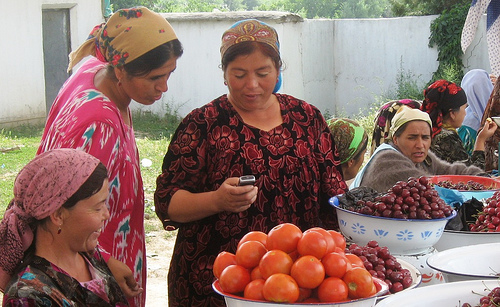Women in Tajikistan
Again, a nuanced perspective is required here that takes into account developments over time. I know for instance a case of a single mother with three children who married her daughter within the age of 17 because of financial constraints.

The measure should, therefore, be seen within the context of the president’s makes an attempt at tightening the noose on the opposition Islamic Renaissance Party of Tajikistan (IRPT), which he has almost fully dismantled over the previous 5 years. President Rahmon, who has been in power since 1992, has grown increasingly authoritarian over the years, limiting private life and political expression within the Central Asian republic.
Other limitations can also maintain women from seeking help or halt them within the process. Many women have little or no revenue of their very own and rely on the help of their breadwinning, and abusive, partners. Women often fear sending an abusive partner to jail, as it would mean the lack of his earnings, and so they and their kids can’t survive without the monetary assist.
It all began back in 2009 when three like-minded women opened and registered a public organisation with the mission to assist women in want. Along with counseling, they have been offering stitching programs in order that the women acquire a good practical ability that may enable them to cover their basic needs instead of “operating from pillar to post” says Umeda Sadritdinova, director of the group. When some of the women voiced their curiosity in culinary, Umeda and her group began desperately in search of options.

Tunisia: Unfinished Rights Business
Many women think about training and financial independence as extremely essential and thus spend the time earlier than marriage at university, job training and full-time employment. During this time, women start to take over duty for leading their very own family and the transition into the married standing appears to me less abrupt.

Other harmful practices that can heighten the risk of home violence embody polygamy and unregistered, pressured, and child marriages, even though the federal government has raised the wedding age to 18 and taken steps to ensure that couples register their marriages with the state. Other obstacles include monetary dependence on abusers and worry of dropping custody of their youngsters. Many women stated they remained in abusive relationships or tried to reconcile with abusive husbands who had deserted them because they and their kids would in any other case go hungry. Women interviewed reported enduring years of abuse, normally by husbands or companions, together with rape, stabbing, strangulation, and beatings with sharp and heavy objects corresponding to a shovel, a fireplace poker, an iron, and a chair.
Tajik girls are tall and slim, which makes them look like the world’s greatest supermodels. And with the amazing ability to remain fit even through multiple childbirths, they continue trying gorgeous for a very long time after getting married. In most instances, a Tajikistan girl will have olive skin and black, shiny hair that she considers to be her greatest source of satisfaction. The facial features of Tajik girls are highly seen and striking, which allows these women to look fabulous even with no make-up on.
The venture is a collaboration with scientists Professor Abdusattor Saidov (Institute of Zoology and Parasitology of Academy of Sciences, Tajikistan) and Dr. Abdulnazar Abdulnazarov (Pamir Biological Institute of Academy of Sciences, Tajikistan). Its purpose is to convey together main Tajik scientists and local communities to document and synergize scientific and traditional data on climate change. They can be each, as demonstrated in this Our World video-temporary showcasing the perspectives on climate change of Tajik women. Words In The Bucket is a group of global residents with the frequent objective of elevating awareness and details about points associated to human rights protection, social inclusion, improvement and surroundings.
A mountainous Central Asian nation of some 8 million people, Tajikistan is among the many world’s 30 poorest international locations. Poverty declined from eighty one% in 1999 to 47 % in 2009 and it’s estimated that poverty dropped to about 32% in 2014. Extreme poverty dropped even faster —from seventy three% to 14% during period1. In rural areas, almost seventy five per cent of the people reside beneath the poverty line.Women undergo disproportionately from this poverty.
What To Wear: A Style Guideline For Tajik Women
My work exhibits that in present-day Tajikistan the establishment of the household plays a tremendously essential function in the provision of care and social safety. This is particularly evident when one thinks concerning the extreme underfunding of state welfare establishments. In the final decades of the 20th century, Tajik social norms and even de facto government policy favored a traditionalist, restrictive attitude towards women that tolerated wife beating and the arbitrary dismissal of ladies from responsible positions. In the late Soviet period, Tajik girls still generally married while underneath-age, regardless of official condemnation of this practice as a remnant of the feudal Central Asian mentality. Despite the possible hardships of their life before marriage, Tajik women have retained their most essential quality — their kindness.
Submission to UN Human Rights Committee’s Review of Tajikistan
Also, women in Tajikistan are largely Muslim, apart from those that are not ethnic Tajiks. Tajikistan brides aren’t well-recognized to western men and thus, we wish to let you understand as much as attainable about that country and women there. In 2018 and 2019, the Access to Information challenge https://asianbrides.org/tajikistan-women/ worked with Vecherka to construct up its capability in multimedia journalism and viewers engagement. Under the steerage, mentorship, and hands-on trainings supplied by Internews, Vecherka also launched an info campaign that advocates for the rights of ladies and kids with disabilities.
When Zebo asked neighbors for assist, they answered, “How can we take you in? This is a household affair.” Zebo and her children have been left on the street.
Like in Tajikistan, women’s lives change with the start of their first youngster and I consider they share the same worries a few good schooling and basic properly-being of their kids as I described for Tajik women. In Germany, virtually all married couples stay in a separate family and plenty of of them not in close proximity to paternal households. Thus, they can’t at all times share the childcare with grandparents as in Tajikistan where married couples often reside in the family of the husband’s parents for some years.
Economic Dependence on Abusers
Forty-seven of those were in-particular person interviews with survivors of domestic violence and 21 had been in-individual with specialists, service providers, attorneys, local NGO activists, authorities officers, and representatives of international organizations. An additional thirteen interviews (eight with survivors and five with experts) had been conducted by telephone between August 2018 and July 2019, adding as much as a total of 81 interviews. The Family Violence Law does not recognize home violence as a crime, providing just for administrative legal responsibility. Victims seeking prosecution and punishment of the abuser should deliver claims under articles of the Tajik Criminal Code that govern assault and comparable acts involving force or violence. The law doesn’t define the time period “family” and, in accordance with the interpretation of a number of consultants and girls’s rights attorneys, leaves women who are divorced or in polygamous, baby, or unregistered marriages unprotected.
